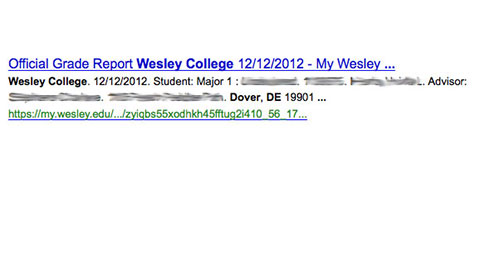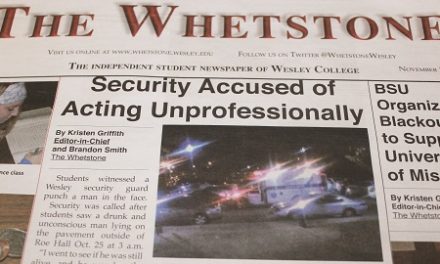By Melissa Boyd (Whetstone staff writer)
Freshman Huida Harris was shocked to find her fall semester grades available online to anyone who wanted to see them.
“I gave no permission to anyone to put my personal information out in public,†said Harris, who could find them via Wesley.edu or google.com. “When I saw that, I became very upset because your I.D. number is also connected with your Social Security number, and with the amount of weirdos out in this world, all I can think was identity theft and my lack of trust with my college.â€
All of Harris’ grades from last semester, along with her ID number, first and last name, adviser name, major and address were available for anyone who searched her name in Google or Wesley’s databases.
This has never happened before at Wesley, said Jody Sweeney, Wesley’s chief technology officer,
“The student’s grades were not ‘posted,’†he said. “The student was reviewing their grades on the MyWesley website, which provides a method to create a document for print.â€
After the document is available to be printed, he said, it’s possible for the document to be made into a temporary file via scanning, which is what Webcrawler, a Google search engine, did.
“This is very common in the industry,†he said. “Webcrawler looks at every website on the planet and creates an index of documents available for research. If the document isn’t there, it cannot be scanned.â€
Sweeney said the possibilities of this happening are rare.
“It would be literally impossible to seek out information on a specific student, even knowing they had just looked at their grades,†he said.
Harris said her parents called the college to discuss FERPA (Family Education Rights and Privacy Act) violations and how to fix the situation.
FERPA provides the right to educational privacy for students, including not releasing any educational records without the student’s permission unless it is sent to: another institution if the school is educationally interested in the student or the student is transferring there; audits within the school; financial aid within the school; accrediting organizations; judicial orders requested through law; and health and safety emergency personnel and state/local authorities.
Wesley, along with other colleges and universities, gives students the opportunity to sign FERPA confidentiality papers, which, depending on a student’s preference, allows nobody or certain people to see their education records and speak on their behalf, such as their parents or guardians.
“What was done was unacceptable, unprofessional and against the law,†Harris said. “I wanted them to do a deep search into how this happened and who did it so that no other student has to endure it.â€
Harris’ family had considered suing the school if her grades were not taken off of the server within 24 hours of her contacting the school, and she also requested a letter from the school board and dean, apologizing for the incident.
Harris said that the school did not send a letter of apology, but did telephone her to apologize.
“I am done with the madness that Wesley started,†she said. “But I am satisfied [with the phone call] because there is nothing else I can do.â€
Dr. Patricia Dwyer, vice president of academic affairs, said that as soon as she heard about the problem, she contacted IT immediately.
“Administrative assistant Tina Heesh-Mosley let the student know that this type of occurrence had never been brought to our attention before,†she said. “We told her that IT was working on it to find out ways to ensure nothing like this could happen in the future.â€
Dwyer said steps were taken immediately to fix the problem.
“IT immediately started working to figure out why this occurred and what steps were being taken to correct it,†she said.
Sweeney said the problem was resolved quickly, helping to decrease the possibility for this to happen to other students.
“We have researched a process to change the student’s ID number to protect the information that was seen by the person who reported this issue,†he said. “We will look at the process again at the end of the Spring 2013 term, and move forward with the change at the student’s request.â€





